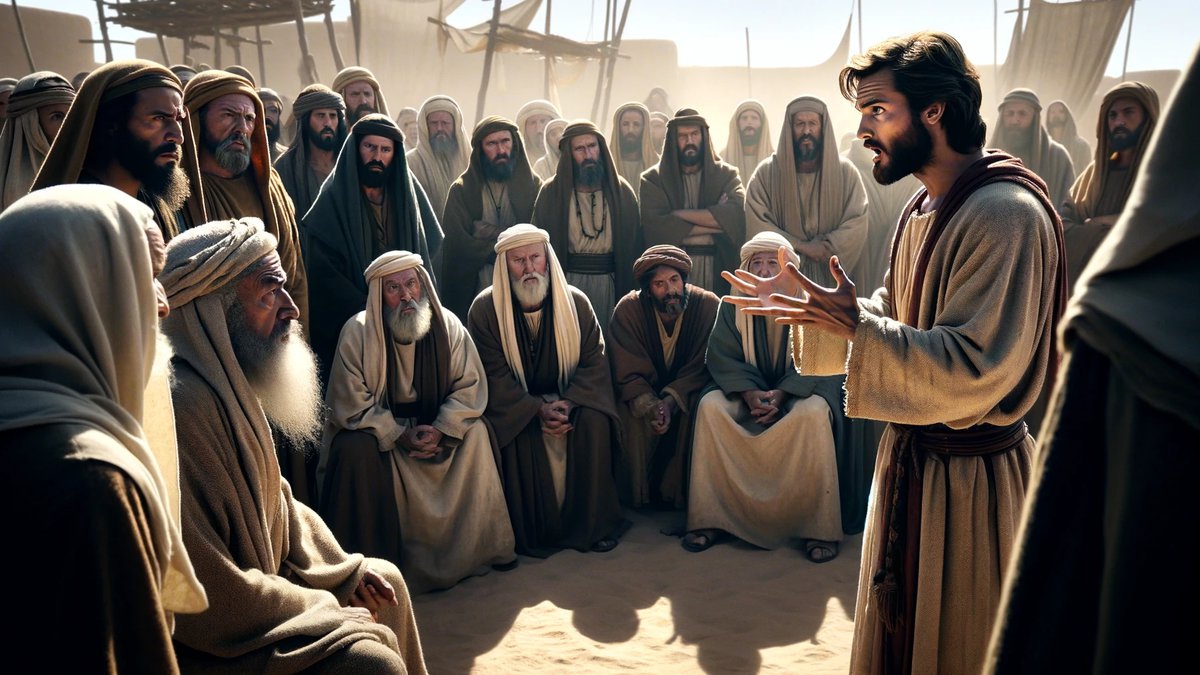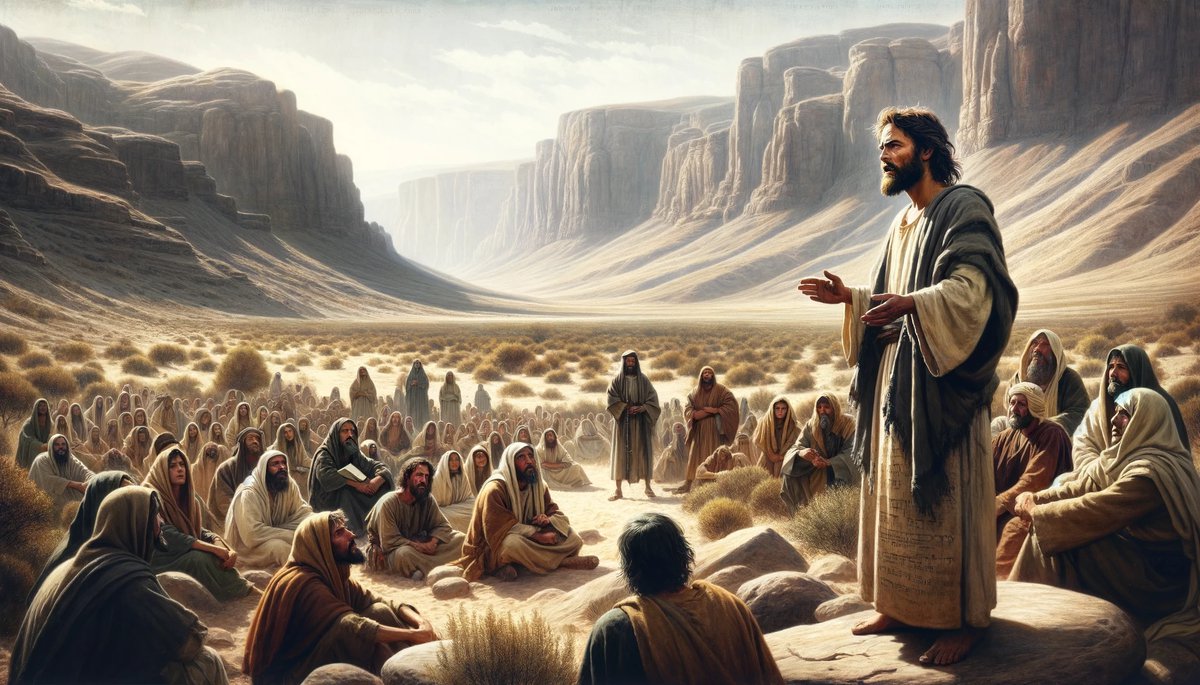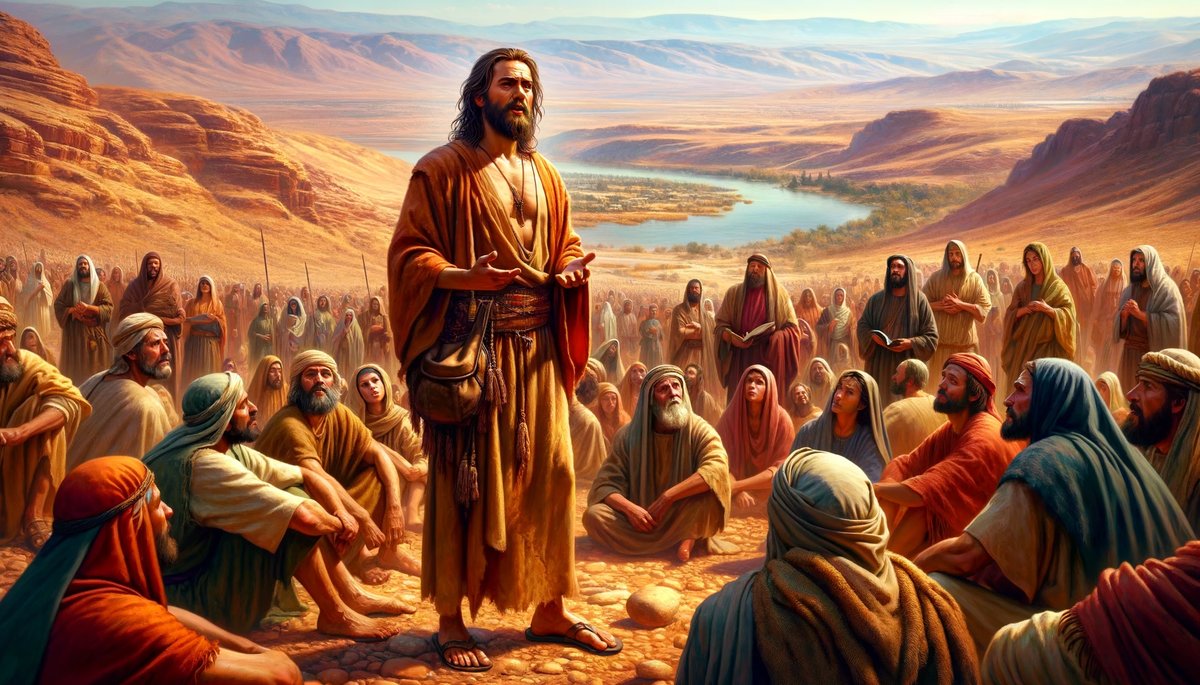Home>Theology and Spirituality>What Authority Did John The Baptist Have


Theology and Spirituality
What Authority Did John The Baptist Have
Published: February 22, 2024
Peter Smith, Editorial Director at Christian.net, combines deep insights into faith, politics, and culture to lead content creation that resonates widely. Awarded for his contributions to religious discourse, he previously headed a major organization for religious communicators, enhancing dialogue on faith's societal impacts.
Discover the authority of John the Baptist in theology and spirituality. Explore his significance and impact in religious history.
(Many of the links in this article redirect to a specific reviewed product. Your purchase of these products through affiliate links helps to generate commission for Christian.net, at no extra cost. Learn more)
Table of Contents
Introduction
John the Baptist, a pivotal figure in Christian history, is known for his profound impact on the ministry of Jesus Christ. His authority and influence were deeply rooted in his divine calling and his unwavering commitment to preparing the way for the Messiah. Understanding the extent of John the Baptist's authority provides valuable insights into the significance of his role in the narrative of Christianity.
As we delve into the authority of John the Baptist, it becomes evident that his life and ministry were marked by a sense of divine purpose and a profound connection to the unfolding of God's redemptive plan. From his unique position as the herald of Christ to his powerful call for repentance, John the Baptist's authority emanated from a spiritual depth that resonated with multitudes.
Exploring the multifaceted dimensions of John the Baptist's authority allows us to grasp the profound impact he had on the spiritual landscape of his time and beyond. His authority was not merely a product of human recognition or societal status; rather, it was firmly grounded in his divine commission and unwavering dedication to fulfilling God's purpose.
In the subsequent sections, we will delve into the various facets of John the Baptist's authority, shedding light on the divine origins of his calling, his pivotal role in baptizing believers, his preparation of the way for Jesus, and his impassioned call for repentance. Through this exploration, we aim to gain a deeper understanding of the remarkable authority vested in John the Baptist and its enduring significance in the tapestry of Christian faith.
John the Baptist's Authority from God
John the Baptist's authority emanated from a divine mandate that transcended human accolades or societal recognition. His very existence was intricately woven into the fabric of God's redemptive plan, as foretold by the prophets of old. The Gospel of Luke vividly portrays the divine orchestration surrounding John the Baptist's conception, as the angel Gabriel appeared to his father, Zechariah, to announce his impending birth. This divine encounter signified John's predestined role as the forerunner of the Messiah, a calling that was ordained by God Himself.
The authority vested in John the Baptist was not conferred through traditional means of succession or earthly hierarchies; rather, it was a divine bestowment that transcended human understanding. His very name, "John," meaning "graced by God," epitomized the divine favor and purpose that enveloped his life from its inception. This divine favor was further underscored by the prophetic declaration that John would be filled with the Holy Spirit even from his mother's womb, setting him apart for a sacred and unparalleled mission.
John the Baptist's authority from God was intricately intertwined with his identity as the fulfillment of the prophecy in Isaiah 40:3, which heralded the voice crying out in the wilderness, "Prepare the way of the Lord." This prophetic pronouncement underscored the divine commission that undergirded John's authority, positioning him as the pivotal figure tasked with heralding the imminent arrival of the long-awaited Messiah.
Furthermore, John's authority from God was evidenced by the profound anointing that accompanied his ministry. His impassioned proclamation of repentance and the impending kingdom of God resonated with divine authority, drawing multitudes to the wilderness to heed his transformative message. The divine empowerment that enveloped John's ministry was palpable, as hearts were stirred, lives were transformed, and a sense of spiritual anticipation permeated the land.
In essence, John the Baptist's authority from God was not a product of human endorsement or scholarly pedigree; rather, it was rooted in the divine sovereignty that ordained his birth, anointed his ministry, and positioned him as the prophetic voice heralding the dawn of a new era. His authority emanated from the very heart of God's redemptive narrative, marking him as a luminary figure whose life and ministry were intricately intertwined with the unfolding of divine purpose.
John the Baptist's Authority to Baptize
John the Baptist's authority to baptize was deeply rooted in his divine commission as the forerunner of the Messiah. Baptism, as practiced by John, symbolized a profound spiritual transformation and a tangible expression of repentance. His authority to baptize was not derived from human tradition or religious formalities; rather, it stemmed from the divine mandate to prepare the hearts of the people for the imminent arrival of the long-awaited Savior.
The act of baptism, as administered by John, signified a powerful symbol of cleansing and renewal, echoing the prophetic imagery of purification and spiritual restoration. Those who sought baptism at the hands of John were acknowledging their need for repentance and embracing a transformative journey towards spiritual renewal. The authority with which John administered baptism resonated with a divine authenticity that transcended mere ritualistic practices, stirring the hearts of the people and igniting a fervent pursuit of spiritual restoration.
John's authority to baptize was underscored by the profound impact it had on the multitudes who flocked to the Jordan River to partake in this symbolic act. His impassioned call for repentance and the administration of baptism served as a catalyst for spiritual awakening, prompting individuals to confront their shortcomings and embrace a renewed commitment to righteousness. The authority with which John administered baptism was not rooted in coercion or religious formalism; rather, it emanated from a deep wellspring of divine authenticity that resonated with the hearts of those who sought spiritual transformation.
Furthermore, John the Baptist's authority to baptize was intricately linked to the prophetic significance of water baptism as a precursor to the baptism of the Holy Spirit, which would be ushered in by the Messiah. His baptismal ministry served as a preparatory phase, laying the foundation for the transformative work that would be wrought through the ministry of Jesus Christ. In this sense, John's authority to baptize was a pivotal component of God's redemptive narrative, positioning him as the harbinger of a new era marked by spiritual renewal and divine transformation.
In essence, John the Baptist's authority to baptize was a testament to his pivotal role in preparing the hearts of the people for the advent of the Messiah. His baptismal ministry, infused with divine authority, served as a catalyst for spiritual awakening and a tangible expression of repentance, laying the groundwork for the transformative ministry of Jesus Christ.
John the Baptist's Authority to Prepare the Way for Jesus
John the Baptist's authority to prepare the way for Jesus was a pivotal aspect of his divine commission. As the prophesied forerunner of the Messiah, John's authority emanated from the profound significance of his role in heralding the imminent arrival of Jesus Christ. This authority was not merely a symbolic gesture; rather, it encompassed a profound spiritual mandate that reverberated throughout the Judean wilderness and beyond.
The preparation of the way for Jesus, as entrusted to John the Baptist, was rooted in the prophetic pronouncements of the Old Testament, particularly in the book of Isaiah. The prophecy in Isaiah 40:3 foretold the emergence of a voice crying out in the wilderness, "Prepare the way of the Lord, make straight in the desert a highway for our God." This prophetic declaration underscored the divine mandate that undergirded John's authority, positioning him as the harbinger of the long-awaited Messiah.
John the Baptist's authority to prepare the way for Jesus was manifested in his impassioned proclamation of repentance and the impending arrival of the kingdom of God. His compelling message resonated with divine authenticity, stirring the hearts of the people and igniting a fervent anticipation for the arrival of the Messiah. The wilderness became the stage for John's transformative ministry, where multitudes gathered to heed his prophetic call and partake in the symbolic act of baptism, signifying their readiness for the transformative work that Jesus would usher in.
Furthermore, John's authority to prepare the way for Jesus was underscored by his unwavering commitment to humility and selflessness. Despite his own burgeoning popularity, John consistently directed the focus towards the coming Messiah, declaring, "He must increase, but I must decrease" (John 3:30). This profound humility exemplified John's understanding of his role as the herald of Christ, further accentuating the divine authority that permeated his ministry.
In essence, John the Baptist's authority to prepare the way for Jesus was a testament to his pivotal role in the grand narrative of redemption. His prophetic proclamation, coupled with the symbolic act of baptism, served as a clarion call for spiritual readiness, preparing the hearts of the people for the transformative ministry of Jesus Christ. This authority, rooted in divine commission and prophetic fulfillment, positioned John as a luminary figure whose life and ministry were intricately intertwined with the unfolding of God's redemptive plan.
John the Baptist's Authority to Call for Repentance
John the Baptist's authority to call for repentance stemmed from a profound divine mandate that resonated with unwavering conviction and transformative power. As the herald of the Messiah, John's call for repentance was not a mere exhortation based on human wisdom or moralistic standards; rather, it emanated from a deep wellspring of divine authenticity that reverberated throughout the Judean wilderness.
The authority with which John the Baptist called for repentance was rooted in the prophetic tradition of the Old Testament, where the voices of the prophets echoed the timeless call for spiritual renewal and turning back to God. John's impassioned plea for repentance echoed the prophetic fervor of his predecessors, underscoring the enduring relevance of this foundational principle in the journey of faith.
Furthermore, John's authority to call for repentance was underscored by the profound impact it had on the multitudes who flocked to the wilderness to heed his transformative message. His call was not a mere moralistic discourse; rather, it was a clarion call for a radical reorientation of the heart and a transformative shift towards righteousness. The authenticity and urgency with which John proclaimed the message of repentance stirred the hearts of the people, prompting them to confront their shortcomings and embrace a renewed commitment to spiritual wholeness.
Moreover, John the Baptist's authority to call for repentance was intricately intertwined with the imminent arrival of the Messiah. His prophetic proclamation of repentance served as a preparatory phase, laying the foundation for the transformative work that would be wrought through the ministry of Jesus Christ. The call for repentance was not an end in itself but a pivotal step towards embracing the redemptive message that Jesus would bring, underscoring the profound significance of John's authority in preparing the hearts of the people for the advent of the Messiah.
In essence, John the Baptist's authority to call for repentance was a testament to the transformative power of his ministry and the enduring relevance of the call to spiritual renewal. His impassioned plea for repentance, rooted in divine authenticity and prophetic fervor, positioned him as a luminary figure whose life and ministry were intricately intertwined with the unfolding of God's redemptive plan.
Read more: What Did John The Baptist Preach
Conclusion
In conclusion, the authority of John the Baptist was not merely a product of human recognition or societal status; rather, it was deeply rooted in his divine calling and unwavering commitment to preparing the way for the Messiah. From his unique position as the herald of Christ to his powerful call for repentance, John the Baptist's authority emanated from a spiritual depth that resonated with multitudes.
John the Baptist's authority was intricately intertwined with his identity as the fulfillment of the prophecy in Isaiah 40:3, heralding the voice crying out in the wilderness, "Prepare the way of the Lord." This prophetic pronouncement underscored the divine commission that undergirded John's authority, positioning him as the pivotal figure tasked with heralding the imminent arrival of the long-awaited Messiah.
Furthermore, John's authority to baptize and call for repentance was not derived from human tradition or religious formalities; rather, it stemmed from the divine mandate to prepare the hearts of the people for the imminent arrival of the long-awaited Savior. His baptismal ministry, infused with divine authority, served as a catalyst for spiritual awakening and a tangible expression of repentance, laying the groundwork for the transformative ministry of Jesus Christ.
The preparation of the way for Jesus, as entrusted to John the Baptist, was rooted in the prophetic pronouncements of the Old Testament, particularly in the book of Isaiah. The prophecy in Isaiah 40:3 foretold the emergence of a voice crying out in the wilderness, "Prepare the way of the Lord, make straight in the desert a highway for our God." This prophetic declaration underscored the divine mandate that undergirded John's authority, positioning him as the harbinger of the long-awaited Messiah.
In essence, John the Baptist's authority was a testament to his pivotal role in the grand narrative of redemption. His prophetic proclamation, coupled with the symbolic act of baptism, served as a clarion call for spiritual readiness, preparing the hearts of the people for the transformative ministry of Jesus Christ. This authority, rooted in divine commission and prophetic fulfillment, positioned John as a luminary figure whose life and ministry were intricately intertwined with the unfolding of God's redemptive plan.














